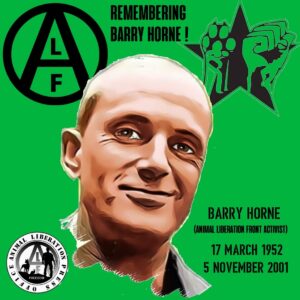“The fight is not for us, not for our personal wants or needs. It is for every animal that has ever suffered and died in the vivisection labs, and for every animal that will suffer and die in those same labs unless we end this evil business now. The souls of the tortured dead cry out for justice, the cry of the living is for freedom. We can create that justice and we can deliver that freedom. The animals have no-one but us, we will not fail them.” Barry. Sept 1998
Barry’s life
The third hunger strike
I want to go back to that 3rd hunger strike because nothing was ever the same after that. Barry had gone on this hunger strike with more determination than ever. He’d recently been slammed with an 18 year prison sentence. I remember sitting in court, at his sentencing, and letting out a sigh of relief when the prosecution accepted that he had never intended to endanger or harm anyone but then the judge just carried on regardless with a savagely long sentence.
Barry never took anything lying down and carried on fighting from within prison. He knew that he had the strength and determination to take a hunger strike to its limits if necessary. There would be no backing down on this one unless the goverment delivered on its pre-election promises.
He set out to make a major breakthrough in the institutionalized support of vivisection and he was going to use his own life as the bargaining chip. Tony Blair had made promises and Barry was simply taking him to task for it. If they ignored his demand to hold a total review of the vivisection industry then his death would be on their hands, to add to the millions of animal victims.
In the infamous catalogue of lies “New Labour, New Life” they promised amongst other things to hold a Royal Commission into vivisection. For many it was a surprise to see Barry getting involved with politics but once again it soon became clear that he had a much wider vision than that – he wanted to send a clear message out to us – his friends – that in order to fight for animal liberation it was always necessary to make sacrifices and here he was showing that he was prepared to make the ultimate sacrifice.
By the time the hunger strike had reached day 60, the Home Office again agreed to meet with Barry’s representatives. Barry’s health was rapidly declining, but this time he remained on hunger strike for over a week longer, not believing they were promising anything new.
There was a final communication by fax from Labour MP Kerry Pollard on the 66th day of the hunger strike, promising a parliamentary consultative body. At this stage Barry became very ill and confused and was moved from York Hospital, where he was surrounded by friends and loved ones, back to the isolation of prison and subjected to normal “A Cat” prison visiting conditions.
Immediately George Howarth, the then Home Office minister responsible for animal experiments, stepped in to tell the media that Barry’s hunger strike had been a hoax and “We have not been negotiating with Barry Horne. Nothing has been offered. The Minister always made it clear the government would not give in to blackmail. “There has been no concession, no negotiation, no deal”.
Barry never recovered from the effects of that hunger strike and he died because of it. Nothing was ever heard from the all party animal welfare investigation.
Barry the man/Barry the animal liberation activist
For me there was no distinction between “Barry the man” and Barry the animal liberation activist. He had a wicked sense of humour, a mischievous smile, an incredible level of energy, dedication and sense of self-sacrifice.
He had a kind and gentle heart but also a burning sense of rage towards bullies – be they racist or animal abusers. I’ll never forget his input into a raid we did together at Interfauna on St. Patrick’s night 1990, in which 82 beagles and 26 rabbits were liberated.
In any situation that I think back involving Barry he was always up there at the front – not one for hanging at the back. He always had a high level of frustration for those who he felt were not truly committed. Not that he expected everyone to go down the road that he’d gone down, but what he did expect from people who considered themselves to be animal liberation activists was committment. He had high expectations. He had that sense of urgency running through his veins. He was sensitive to the fact that animals are dying now – being around him you always got that feeling – it was often un-nerving to be around him.
He once told Nancy Phipps on a visit during that 3rd hunger strike, as his health was failing, that he was scared of dying and that, to me, was a sign of his courage that he could face up to such a fear. Mike Hill, Jill Phipps and Tom Worby had no control over their deaths but Barry intentionally gave his life for the animals he cared so much about. He didn’t want to die but now he is dead.


